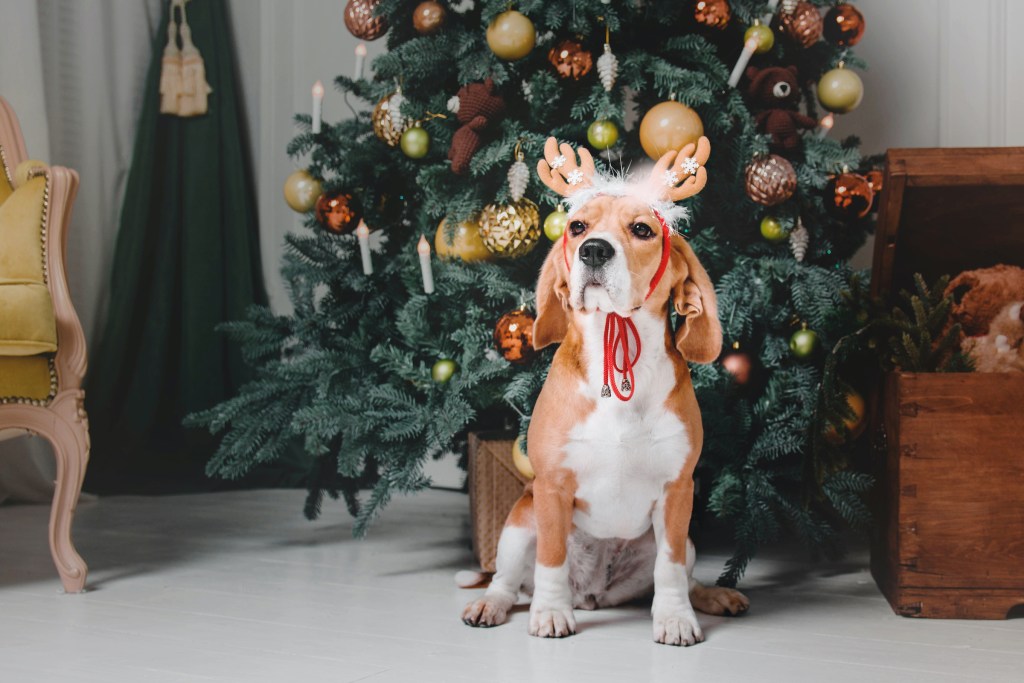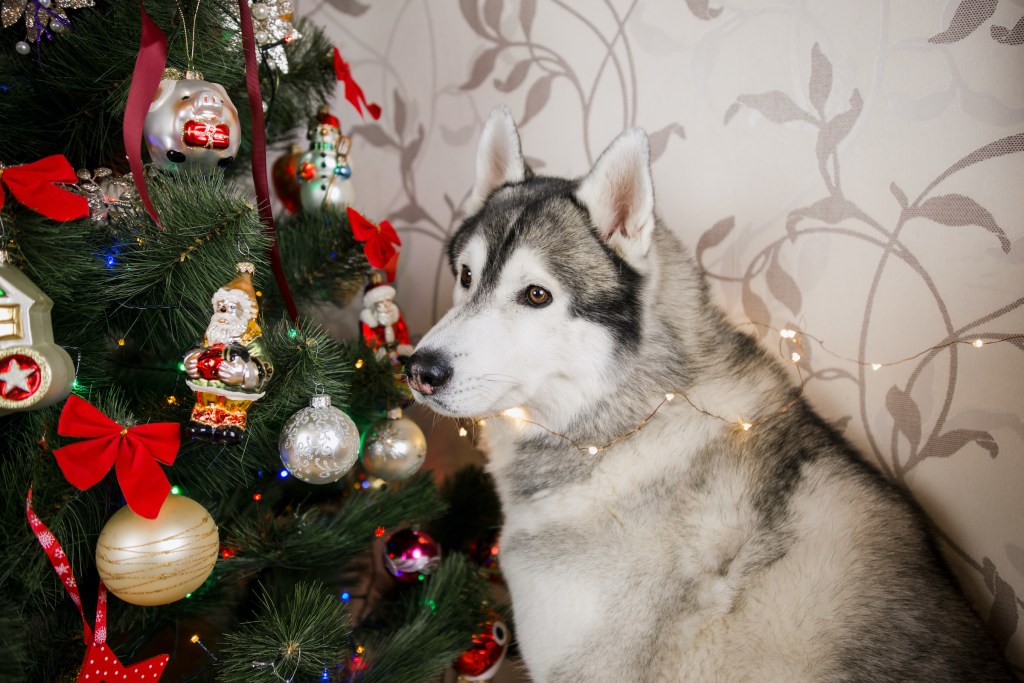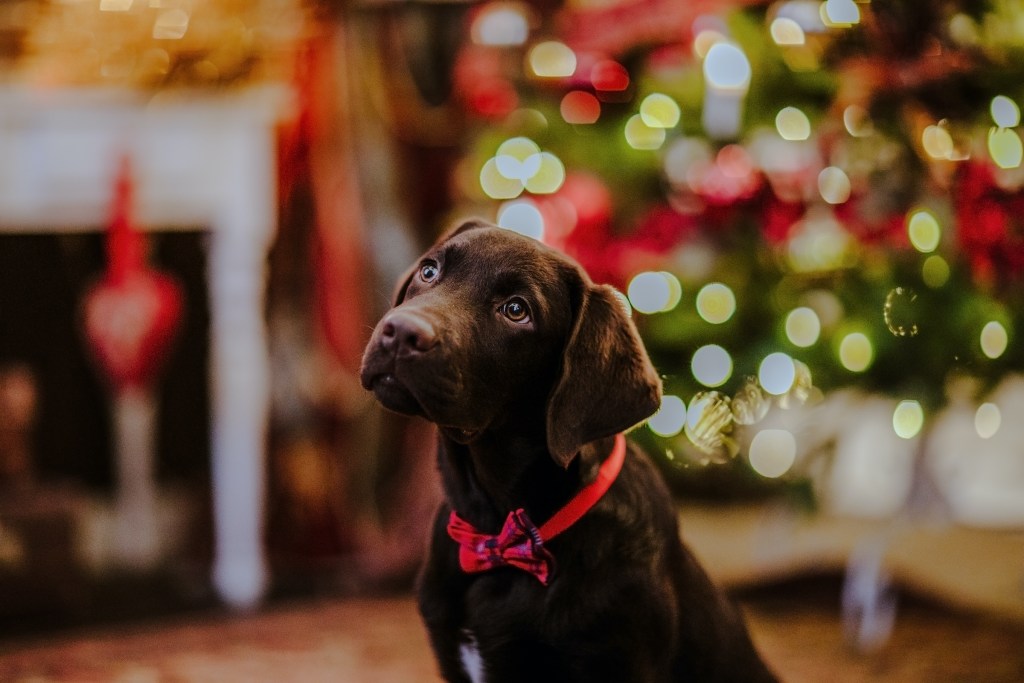Bringing home a fresh-cut Christmas tree is only one way to get into the holiday spirit, but it could cause a problem for your pets. Not only will you need to make sure no one relieves themselves on the tree (in their defense, it is a tree), but you’ll also need to keep them away from the water.
Dogs drinking Christmas tree water may seem completely logical, but it could also lead to a wide variety of unpleasant side effects for them and for you. Keep scrolling to learn why Christmas tree water could be dangerous for your pup and what you can do to prevent your doggo from bothering the tree — all while keeping your Christmas tree healthy, of course!
Protecting your pets this holiday season will help you let go of your worries and enjoy every festive moment so you and your family can have a very merry Christmas!
Why is Christmas tree water bad for dogs?

Even though you may use plain water to keep your tree hydrated during the holiday season — which the National Christmas Tree Association recommends — it’s not a good idea for your dog to drink it. According to the National Capital Poison Center (NCPC), a small amount of tree water may not cause any issues, but it could become a real problem if your pup makes a habit of it. The Pet Poison Helpline notes that vomiting and diarrhea can be some of the signs of poisoning from Christmas tree water.
Water that sits in a tree stand for even a day or two can gather lots of bacteria and other nasty particles, according to NCPC (not to mention the pine needles that will likely fall into the water — they can be sharp). It’s easy to see why this concoction could be dangerous when swallowed. Hartz notes that fir tree oil can also be mildly irritating to dogs, too, whether ingested or simply touched. It makes sense — even some people experience allergies and irritation around these trees!
Sometimes, Christmas tree farms use preservatives to help their firs and spruces last. NCPC explains that commercial preservatives often contain “some kind of fertilizer, some type of sugar, and perhaps fungicides.” This can seep into the water, which could cause mild to severe illness in pets.
Homemade fertilizers and pesticides can make an appearance, too. NCPC lists these common ingredients in DIY tree food:
- Soda
- Whiskey
- Bleach and vinegar or lemon juice
- Aspirin
- Corn syrup
They may sound innocent, but many of these ingredients are toxic to dogs. Alcohol, for example, is extremely poisonous for canines, and aspirin should only be given under veterinary supervision. Obviously, no one should ingest bleach, but combining it with vinegar can also produce a dangerous, even lethal, byproduct — chlorine gas — which is extremely harmful to inhale no matter what species you are.
Four ways to stop dogs from drinking Christmas tree water

Luckily, there’s a lot you can do to keep your beloved pup from sipping tree water. You can use many at-home tricks that will only take a couple of seconds out of your day. Despite the slight inconvenience, it will keep your pooch safe — and maybe even save his life. It’s worth it, don’t you think?
Hydration is always important, and it can keep a dog from looking for water in places they shouldn’t
Of course, you can start by ensuring your fur baby always has plenty of fresh water. This might discourage him from trying out the Christmas tree water, but a curious pup may still be tempted.
Deterrent methods, like gates or bitter tastes, might be necessary
A pet or baby gate might be your best bet for keeping dogs away from the tree altogether, especially when you need to leave the house. At least you can decorate a gate, so it’s just as festive as the tree! Additionally, a deterrent spray like Grannick’s Bitter Apple Spray for dogs can also discourage any unwanted curiosity.
Covering the Christmas tree water could help you avoid problems
Granville Veterinary Clinic also shared their genius idea: using some kind of large lid (like off of a plastic storage container) to create a cover for the tree water bowl. All you need to do is cut a hole in the middle of the lid that’s big enough to fit around the tree trunk. You’ll also need to cut a slit in the side of the lid to help slide the cover on and off. You may need to tape or weigh it down to keep out stubborn pups who might try to move it.
If you need to, you can always skip the farm-fresh tree this year
Of course, you can opt for an artificial Christmas tree to avoid the entire water situation this holiday season. Still, you’ll need to keep an eye out for any faux pine needles or other debris that your dog could ingest, especially as your fake tree gets older.
What to do if your dog drinks Christmas tree water this winter

If you notice or even suspect that your dog drank water from the tree stand, keep a close eye on his behavior and bowel movements. Mild cases of toxicity might not result in any symptoms at all, though you should still encourage your pup to stay hydrated with his own water. If you know the tree stand bowl contains anything like alcohol, bleach, or another substance highly toxic to dogs, take your dog to your trusted veterinarian immediately if you see him drinking from the bowl. Don’t wait!
If you notice any symptoms like nausea, vomiting, lethargy (including refusal to eat), excessive drooling, or diarrhea, give your vet a call. Not many situations end up being an emergency, but the sooner you can take care of them, the sooner your pup will be back to enjoying the holidays.
Is it OK if my dog eats my Christmas tree?

Now that you know how to keep your pup pup from drinking the water under it, we have to quickly go over what to do about the tree itself. Lots of dogs love to eat sticks and so your Christmas tree might look like a giant chew toy. It probably won’t do any harm if they nibble a little bit here and there.
However, you certainly don’t want them consuming large amounts of pine, especially the needles as they can cause stomach issues. A pooch who has ingested too many pine needles might get vomiting or diarrhea. You can always use a deterrent like hot sauce or orange peels to keep your pet away or use the earlier method of putting up a pet gate.
Did you know that Christmas trees aren’t the only holiday plants that pose potential dangers to your dog?

It’s true! We’re sorry to report that several other plants commonly seen around the holidays also have the potential to poison a pet. The popular Poinsettia, for example, has leaves containing a sap that irritates the skin, mouth, esophagus, and stomach. Because of the uncomfortable sensation it causes, though, a pet is unlikely to consume enough to cause major damage.
Plants that you should be more worried about include holly and mistletoe, according to GoodRx. The leaves and berries of these plants contain multiple toxic substances that can cause a number of troubling symptoms, including vomiting, hallucinations, seizures, and a fatal drop in blood pressure. Several flowers found this time of year, including lilies, also contain potentially fatal levels of poison for pets.
Any plant could have pesticides, too, so it’s always smart to take caution when giving or receiving a plant that’s kept indoors. One simple internet search could save a life! Whether you’re decorating with flowers or with your brand-new Christmas tree, you can do it safely. Yes — even with an extra curious dog in your home! Keeping everyone safe and healthy is a surefire way to ensure a happy howl-iday season for everyone. Now you can focus on those presents!




